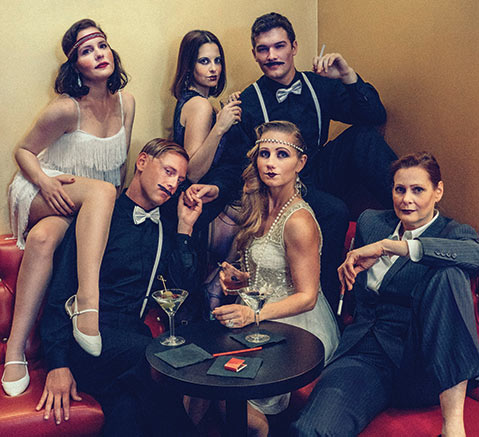Review: The Wild Party
Out of the Box Scores with The Wild Party

Joseph Moncure’s slangy, jazz-age poem The Wild Party has had more incarnations than even the most optimistic fan could have ever expected — from a relatively lousy film that added a whole new central character to a graphic novelization drawn by no less than Art Spiegelman to not one but two stage-musical adaptations. The one produced here by Out of the Box was written by the talented Andrew Lippa, and it’s got to be the best yet, and maybe even — sorry Art — the only one that matters.
Deployed concert-style last weekend at Center Stage, with cabaret seating and a splendid small orchestra, this Wild Party was dark, exciting, and relentless — just the sort of adjectives that any party aspiring to wildness ought to court. Lippa the composer is on fire here, with ideas cascading over one another in almost 30 songs and a plethora of shady action. For Out of the Box, now in its fifth season, this production evinced a remarkable level of maturity and professionalism, even as it pushed to the edge and beyond of what one expects from musical theater.
Queenie (the amazing Rachel Short) and Burrs (the dynamic Justin Bryant Rapp) form the troubled couple at the core of the conflict, and they are the ones throwing this dangerous bash, but it’s Kate (Samantha Eve) and Black (Musique), the just-met pair who walk in late, who very nearly steal the show. Although Queenie decides to have the party in order to get back at Burrs, the clown with a heart of pitch who has a tendency to stray — and hit — it’s really Kate who catalyzes the big conflicts, and she does so by pulling a surprise in the casting. What a great role this was for Eve, who showed incredible stuff not only as a director but also as a singer, actor, and provocateur. Lippa’s dense, throbbing score goes all over the place, from the Broadway of Kander and Ebb to the jazz club and even, at times, to the opera. It was absolutely commonplace for there to be as many as nine characters onstage and singing at any given moment, and the arrangements, expertly handled by the band led by music director Kacey Link, kept the whole complex mosaic of sound swinging.
Deborah Bertling was a blast as Madelaine True, the sexually avaricious singer of “An Old-Fashioned [Lesbian] Love Story.” Katherine Bottoms and J.D. Driskill made a great pair as the ingenue Mae and her pugilist boyfriend, Eddie. The Roaring Twenties costumes, which varied from white-tie to wife beater for the men, and from flapper fringes to slinky slips for the women, were also spot-on. Donnie Ross and Christian Watts played the sexually ambiguous brothers (!) Phil and Oscar D’Armano, and that alone should give some idea of how far in a “wild” direction this script is willing to go.
No account of this fascinating experience of collective effervescence would be complete, however, without recognizing the achievements of Short as Queenie, and Musique (that’s correct — one name) as Black. In the maelstrom of sex, drugs, alcohol, and violence, these two managed to find a way to communicate something redemptive. Aided by Lippa’s score, and grounded by their substantial talents, the story’s dark knight and his white lady suggested, even if they did not get to live it, that there could be something better out there than oblivion. Congratulations to the entire company on making a bold statement in contemporary musical theater.



